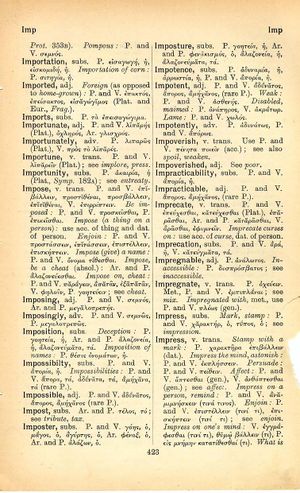imprecate: Difference between revisions
From LSJ
διὸ καὶ μεταλάττουσι τὴν φυσικὴν χρῆσιν εἰς τὴν παρὰ φύσιν αἱ δοκοῦσαι παρθένοι τῶν εἰδώλων → therefore those professing to be virgins of the idols even change the natural use into the unnatural (Origen, commentary on Romans 1:26)
(CSV4) |
m (Woodhouse1 replacement) |
||
| Line 1: | Line 1: | ||
{{Woodhouse1 | {{Woodhouse1 | ||
|Text=[[File:woodhouse_423.jpg|thumb|link={{filepath:woodhouse_423.jpg}}]] | |Text=[[File:woodhouse_423.jpg|thumb|link={{filepath:woodhouse_423.jpg}}]] | ||
P. and V. ἐπεύχεσθαι, κατεύχεσθαι ( | ===verb transitive=== | ||
[[prose|P.]] and [[verse|V.]] [[ἐπεύχεσθαι]], [[κατεύχεσθαι]] ([[Plato]]), [[ἐπαρᾶσθαι]], [[Aristophanes|Ar.]] and [[prose|P.]] [[καταρᾶσθαι]], [[verse|V.]] [[ἀρᾶσθαι]], [[ἐφυμνεῖν]]. | |||
[[imprecate curses on]]: use acc. of [[curse]], dat. of person. | |||
}} | }} | ||
Revision as of 08:57, 20 May 2020
English > Greek (Woodhouse)
verb transitive
P. and V. ἐπεύχεσθαι, κατεύχεσθαι (Plato), ἐπαρᾶσθαι, Ar. and P. καταρᾶσθαι, V. ἀρᾶσθαι, ἐφυμνεῖν.
imprecate curses on: use acc. of curse, dat. of person.

